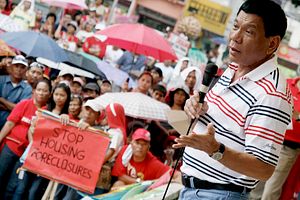On June 30, Rodrigo Duterte took his oath of office as the 16th president of the Republic of the Philippines. As mayor of Davao City in Mindanao for almost three decades, Duterte became prominent primarily because of his tough methods against crime.
During his inaugural speech, Duterte acknowledged that some sectors are not comfortable with his “unorthodox” ways of fighting crime, the sale and use of illegal drugs, and corruption. But he told the public that he will not violate the law.
“As a lawyer and a former prosecutor, I know the limits of the power and authority of the president. I know what is legal and what is not. My adherence to due process and the rule of law is uncompromising,” Duterte emphasized.
This statement is reassuring since Duterte has been quoted several times in the media as saying that he endorses the killing of criminal suspects. In recent weeks, scores of suspected drug lords were killed by the police, prompting many to ask if this was a preview of Duterte’s first 100 days in office.
After vowing to respect the law, Duterte instructed all agencies to implement government contracts without changing the rules.
“I order all department secretaries and heads of agencies to refrain from changing and bending the rules of government contracts, transactions, and projects already approved and awaiting implementation. Changing the rules when the game is ongoing is wrong,” Duterte said.
“I abhor secrecy and instead advocate transparency in all government contracts, projects, and business transactions from submission of proposals, to negotiation, to perfection, and finally to consummation,” he added.
Although this directive is aimed at improving bureaucratic efficiency in general, it could also refer to Duterte’s commitment to protect the business sector. This is encouraging news for investors who signed various contracts with the previous government of Benigno Aquino III.
Aside from extending his sympathies to Turkey, which is still reeling from an airport bomb attack, Duterte told the international community that his government will continue to honor treaties and international obligations.
He didn’t mention the South China Sea (or, as the Philippines calls it, the West Philippine Sea) dispute and the case lodged by the Philippines against China in the International Tribunal of the Permanent Court of Arbitration. But the issue was discussed during the first Cabinet meeting.
Anticipating a favorable ruling from the Arbitration Court on July 12, Duterte cautioned about making any hardline statement against China.
“We will study progressively on how we would utilize it. Of course, it would be a moral victory but we can’t put the country in an awkward position,” he said during the meeting,, which was broadcast live on TV.
“But the bottom line question is what will happen if the decision is in our favor, meaning that the arbitral tribunal will make a declaration about the legality of the nine-dash-line, and will say that this is part of our economic shoal, including Scarborough Shoal. What if, in the face of these circumstances, China will dig in and put us to a test? They will dislodge fisherman again from fishing in Scarborough Shoal,” he added.
As for the issue of peace and order in Mindanao, Duterte vowed to advance an inclusive peace process. He reiterated his earlier pronouncement of involving all stakeholders in drafting a peace agreement that will finally resolve the armed conflict in the southern part of the country.

































